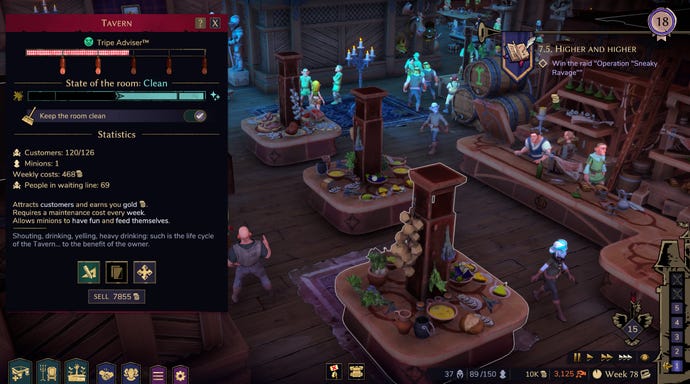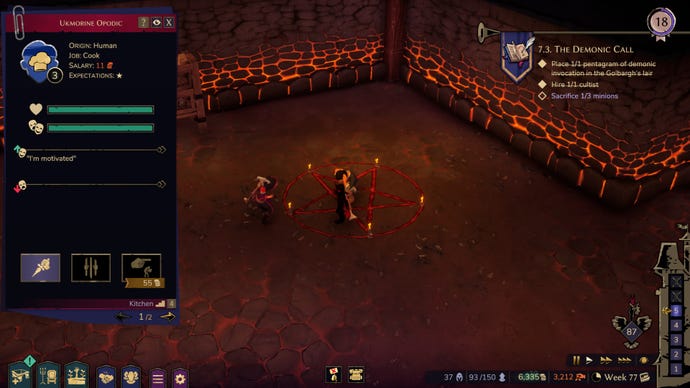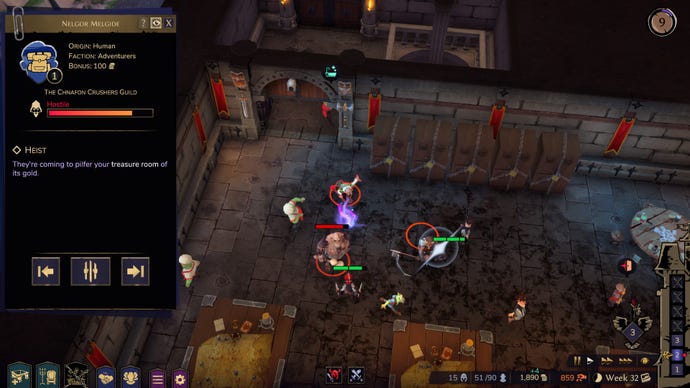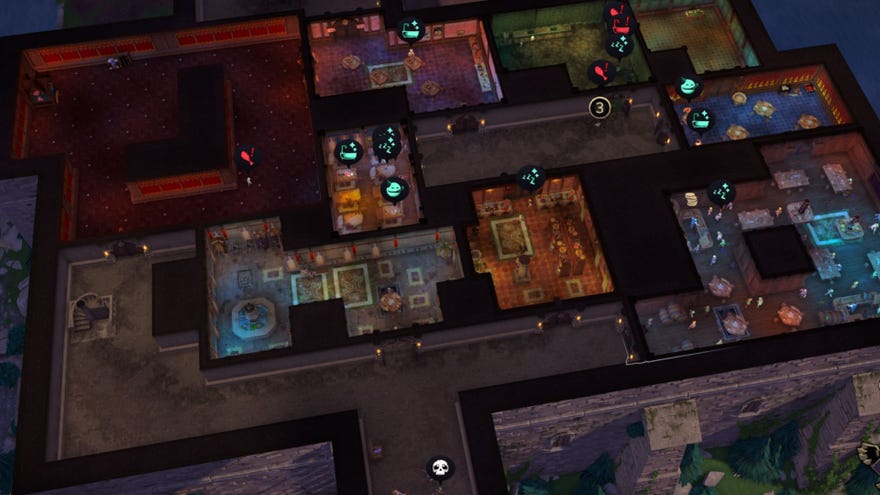Naheulbeuk’s Dungeon Master review: a valiant parody of a satire-proof genre
Dig up, stupid
Naheulbeuk’s Dungeon Master is a staff management game disguised as a dungeon management game. At the start of each week, your minions might choose to go on strike, demanding everything from more cells in the prison to fewer dwarves in the workplace. If that second example elicited a startled little “yikes”, then good, you’re paying attention. Your minions are also occasional racists – which at least makes some of the more brutal options at hand for dealing with striking workers more palatable.
You can sacrifice the entire picket line to your in-house demon lord, or terminate their employment without tribunal. You can also lock them up in those prisons they repeatedly claim are so lacking in cells. Or you can agree to their terms to expand the canteen and sack all of their shortest colleagues. But no matter which option you choose, minion strikes are inconsequential, only ever amounting to a comedy aside. Just as the turn-based Dungeon Of Naheulbeuk set out to skewer D&D, Naheulbeuk’s Dungeon Master is a brave and self-aware parody of dungeon management games. But it's far too barebones to invest in seriously.

So you’ve got the apparent risk of striking minions, and a relentless series of jokes about the bureaucracy of running a dungeon. There’s a huge, fully voiced script in the campaign mode, stacked to the gills with silly gags about technical admin-speak and the dungeon equivalent of an HOA. Each time a group of adventurers invade your dungeon, the results of the raid appear as a form to be stamped and signed off by your belligerent dungeon master.
It’s a perfectly good angle of attack, but underneath the paperwork gags is a fairly rudimentary dungeon simulator with just the trappings of something more complex. Here’s how it shakes down. You carve out rooms in your castle for the various functions of your dungeoning business, such as kitchens, canteens, guard rooms and dormitories. Each of these fulfils the basic needs of your minions, who grow in rank as they work, and become more demanding of high-quality rooms as they gain experience.
You improve the quality of rooms by cramming them with rugs and pictures and torches, which serves to increase your dungeon’s reputation, unlocking new floors for your dungeon and attracting bigger and more lucrative enemies. You can send parties of minions out on raids and missions to other dungeons on a world map, which nets you small rewards and reputational changes. And, of course, you can set up traps for adventurers to stumble into.

In isolation, all of these aspects of the game work just fine. But Naheulbeuk’s Dungeon Master never coheres into anything more than the sum of its ideas. Maxing out your rooms is trivial once your tavern starts generating enough income, for example, leaving you with very little to actually manage around the dungeon.
The worker strikes are another good example of this: your minions really aren’t so valuable or irreplaceable that it’s ever worth trying to appease any of them. There’s no powerful union to reckon with, strikes are just an inconvenient mood that descends on your otherwise satisfied workers at random, and which can always be fixed with a round of redundancies, or simply by waiting for them to become so bored that they quit.
There are more straightforward issues to contend with too, like how your entire minion workforce descends on your treasure room each week to collect their salaries at the same time, only to become so annoyed by the queue that they quit in frustration.
Even your highest ranked guards aren’t worth keeping hold of, as enough low-ranked peons can handily stave off most adventurer incursions. And if your dungeon’s defenders fail and die, the penalty of losing a little gold or a handful of resources is so insignificant as to not matter. Whether in sandbox mode or in the campaign, the balance of things means there’s really not much that would challenge a dungeon designer here. The available real estate is handed over way too readily – you’re given access to fresh new floors faster than you have any use for them, and by floor two you’re already filling the space with extras of rooms you’ve already got.

There are lots of little details to love. The game looks and sounds great. Setting the dungeon in a high-rise castle rather than several storeys below the earth means you get a bucolic landscape as your constant backdrop, instead of miles of plain dirt. There’s a fun accounting menu that shows you graphs of your dungeon’s profits and losses, which made me gasp in delight when I discovered it, until I slowly realised that the screen mostly serves as a superficial extension of the game’s running bureaucracy gag. I also then realised the game’s economy is so sparsely simulated that there’s no useful function to any of its charts and reports.
Naheulbeuk’s Dungeon Master scratches at the Dungeon Keeper itch for a short while, but the problem is that it’s a goofy, comic fantasy story hoping to be carried by a management simulator way too barebones to support it. Parody only works if the underlying offer is interesting enough to be worth investing in, and you can’t ironically play something for any serious length of time before feeling like the joke is on you.
This review is based on a copy of the game provided by the publisher.

